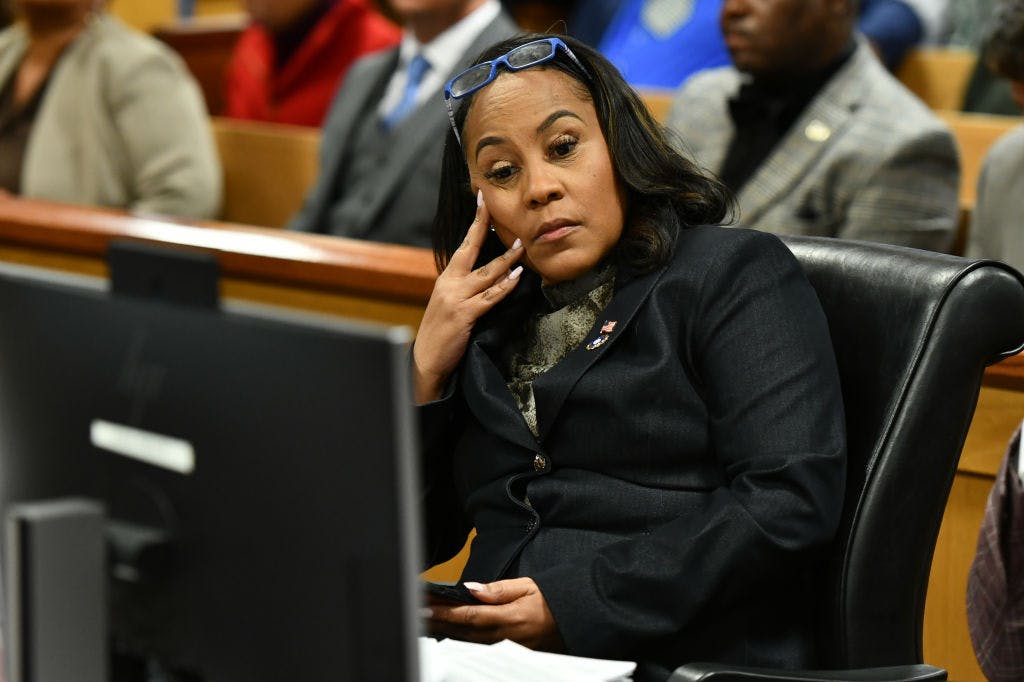Fani Willis’s Office Could Be Forced To Pay Trump’s Legal Bills — With Taxpayer Dollars — After She Was Disqualified Due to Secret Romance
A new bill’s sponsor tells the Sun that the district attorney’s behavior was ‘top of mind’ when he drafted the proposed legislation.

A bill passed by the Georgia senate could mean that the taxpayers of Fulton County are on the hook for paying the mounting legal bills of President Trump and his 18 co-defendants for District Attorney Fani Willis’s prosecution of them for racketeering and election interference.
Peach State senators last week passed — by a 55-0 vote — legislation that awards “reasonable attorney’s fees and costs in a criminal case to the defendant upon such defendant making a successful motion to disqualify the prosecuting attorney for misconduct in connection with the case.”
The bill, clearly directed at Ms. Willis’s case against Mr. Trump, will become law if passed by the Georgia house, which, like the state senate, is controlled by Republicans.
The Sun spoke to the bill’s sponsor, Senator Brandon Beach. The Republican explains that Ms. Willis’s disqualification in December for her secret romance with her special prosecutor, Nathan Wade, was “top of mind” as he drafted the bill that he hopes will curb “personal and prosecutorial misconduct.” Now, the same Fulton County taxpayers who just re-elected Ms. Willis by a large margin could be handed a bill for her cases if the charges are dismissed.
Ms. Willis’s office is funded by the general fund of Fulton County, which comprises much of downtown Atlanta. The district attorney’s office receives about $36 million a year from the billion-dollar fund, which gets most of its revenue from property and sales taxes. The total legal bills, so far, of Mr. Trump and his 18 co-defendants likely add up to several million dollars.
Mr. Beach relates that a friend of his who was indicted by Ms. Willis along with Mr. Trump has spent some $700,000 in attorneys’ fees so far, and also faces “whispering in his country club.” The lawmaker underscores the reputational damage that flows from “finger printing and mug shot taking” and that can “ruin a life.” Mr. Beach acknowledges that he “hates to have taxpayers” pay for the actions of district attorneys, but that he “needs to send a message” to Peach State prosecutors.
The bill is also supported by Democrats. Mr. Beach tells the Sun that Democrats reckon it is “just the right thing to do.” It could be that the bill’s Democratic supporters feel the bill would not reach Ms. Willis’s case because it allows for compensation only in the presence of “misconduct,” not the “significant appearance of impropriety” generated by Ms. Willis’s affair with Mr. Wade.
If Ms. Willis — and the taxpayers who fund her office — are required to compensate her defendants, it would not be the first time in recent weeks that the prosecutor has been handed a bill. In January, Ms. Willis’s office was ordered to pay a conservative legal group, Judicial Watch, $21,000 in legal fees after she failed to properly respond to an open records request for correspondence between her office and then-Special Counsel Jack Smith and the now-dismantled House January 6 committee.
Ms. Willis’s expenditures are central for her disqualification. Her office paid Mr. Wade, who had never prosecuted a felony before, more than $650,000 for his services as special prosecutor. The two took vacations together — at the two state employees’ expense — to destinations like Napa Valley, Aruba, and Belize.
Cellular telephone data adduced by the defendants appears to show that the two began dating before Mr. Wade was hired, a timeline he and Ms. Willis have denied under oath. The justices of the state appeals court, in disqualifying Ms. Willis, said they did not believe them and that the affair compromised Ms. Willis’s decision to bring charges in the first place.
Mr. Wade paid for the exotic trips using his credit card. Ms. Willis contends that she paid him back with cash that she stored at her home. Her father, also under oath, insists that such a practice is a “Black thing.” Judge Scott McAfee, who ruled that Ms. Willis could stay on the case if Mr. Wade departed, found that the couple’s account of their relationship emitted an “odor of mendacity.”
The Georgia court of appeals went one step farther in determining that Judge McAfee erred in allowing Ms. Willis to continue despite his finding that her behavior was “legally improper.” The appeals court found that this is “the rare case in which disqualification is mandated and no other remedy will suffice to restore public confidence in the integrity of these proceedings.”
Mr. Trump’s lead attorney in the case, Steven Sadow, shares with the Sun in a statement: “The Senate bill needs to go further and financially punish the individual prosecutor who engages in misconduct resulting in disqualification. Only then will prosecutors think twice before breaking the rules.”
The path to compensation for Ms. Willis’s defendants could begin if the Georgia supreme court upholds the district attorney’s disqualification, or elects not to hear the issue at all. The case would then pass to an independent prosecutorial commission, which would appoint a new prosecutor with discretion to drop the charges. If that happens, and this bill becomes law, Mr. Trump et al. could petition none other than Judge McAfee for compensation.
Forcing a prosecutor’s office to pay legal fees of defendants, even if they are acquitted of all charges, is unusual, and usually only comes when there is serious prosecutorial misconduct.

